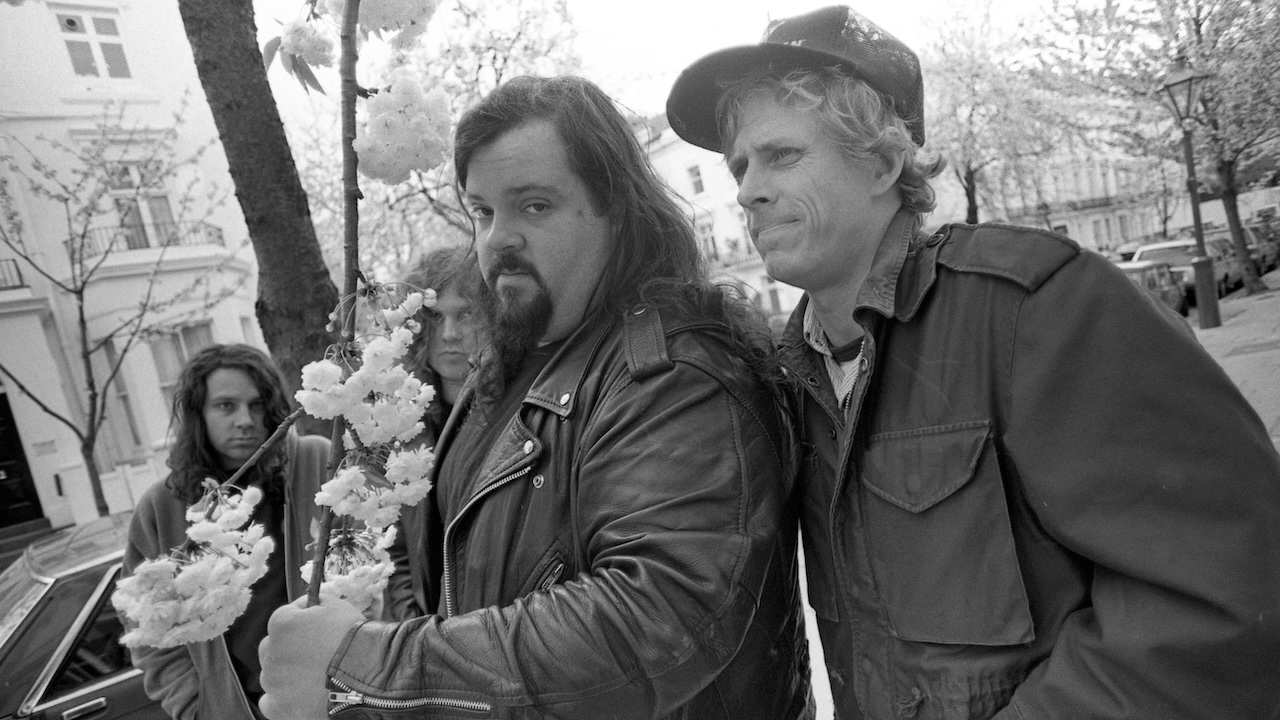Sabaton: One tank, 20,000 people and a f***load of ammo
That's all it took to seal Sabaton’s greatest victory yet. As the power metal machine released their magnum opus, we headed to their biggest-ever show to witness the rise of an unlikely empire
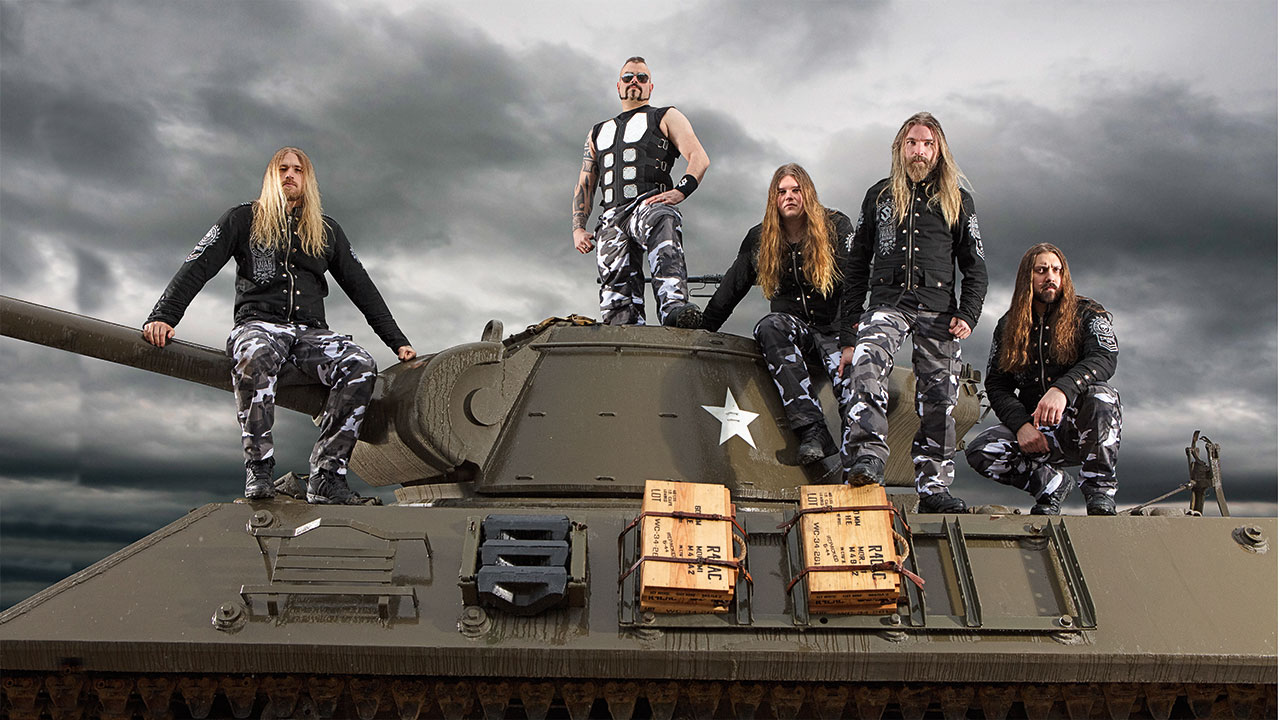
You feel a tank long before you see it, and you hear it long before that. It starts with a distant industrial grind, which soon becomes a low-level physical tremor in your ankles. As it nears, the clanking and rumbling increases, physically shaking the ground until it feels like this weapon of destruction is right on top of you, even though it might still be 20 or 30 metres away.
It’s impossible to comprehend what World War One German soldiers in the trenches of the Somme thought when the British army first deployed 32 of these armoured behemoths on September 15, 1916. Or perhaps it isn’t: the overriding emotions would have been bafflement followed by sheer terror, presumably followed by the feeling of being pounded into oblivion.
More than a century later, even a single tank still has the power to inspire awe. In fairness, it’s not often that you see one rumbling through the backstage area of an outdoor gig, parting a crowd of people – several of whom are dressed in assorted period World War I costumes – and churning up dust in its wake. A man with a clipped mohawk and a bullhorn moustache watches on with pride.
“Looks fucking impressive doesn’t it?” he says. Mr Mohawk is Joakim Brodén, singer and co-commander-in-chief of the five-man army that is Sabaton. “Apparently it can still fire shells. Can you imagine any other band doing this?”
No, is the simple answer. But then other bands aren’t Sabaton. The Swedes have turned the marriage of metal and militaria into some serious musical and commercial firepower, a 14-year campaign that has seen successive territories fall to its might: Scandinavia, Poland, Russia, the Benelux countries, Germany. This summer the band will headline Bloodstock festival, bringing down the last row of defences in one of the few countries that has resisted their onslaught.
Today, Sabaton have set up base in the city of Pilsen in the Czech Republic. In less than 24 hours, the band will be one of the guests of honour at the Liberation Festival. This huge street parade of military vehicles and soldiers, both real and pretend, marks the anniversary of the city’s freeing from Nazi rule in 1945.
Right now, the band are prepping for tonight’s show at the 20,000-capacity Lochotin amphitheatre, a Soviet-era concrete bowl with a zoo one side and a military base on the other. This is Sabaton’s biggest headlining show to date, and they’ve pulled out all the stops: hence the real-life tank to complement the onstage one that acts as a drum-riser.
Sign up below to get the latest from Metal Hammer, plus exclusive special offers, direct to your inbox!
It’s also the opening salvo in the campaign for their ninth album, the epic The Great War, a record that takes their fascination with the great stories, myths and heroes of endless centuries of combat to a logical conclusion.
Its a sort-of homecoming gig for Joakim, too. “My mother is Czech and my maternal grandmother was born less than 40km away, so there’s an emotional connection,” he says. “Plus the beer is amazing.”
This much is true – Pilsen is the home of Pilsner lager, which tastes like no other hop-based booze you’ve ever had. If the man in charge of the tank decides to go crazy with his live gun, at least we’ll all go out happy.
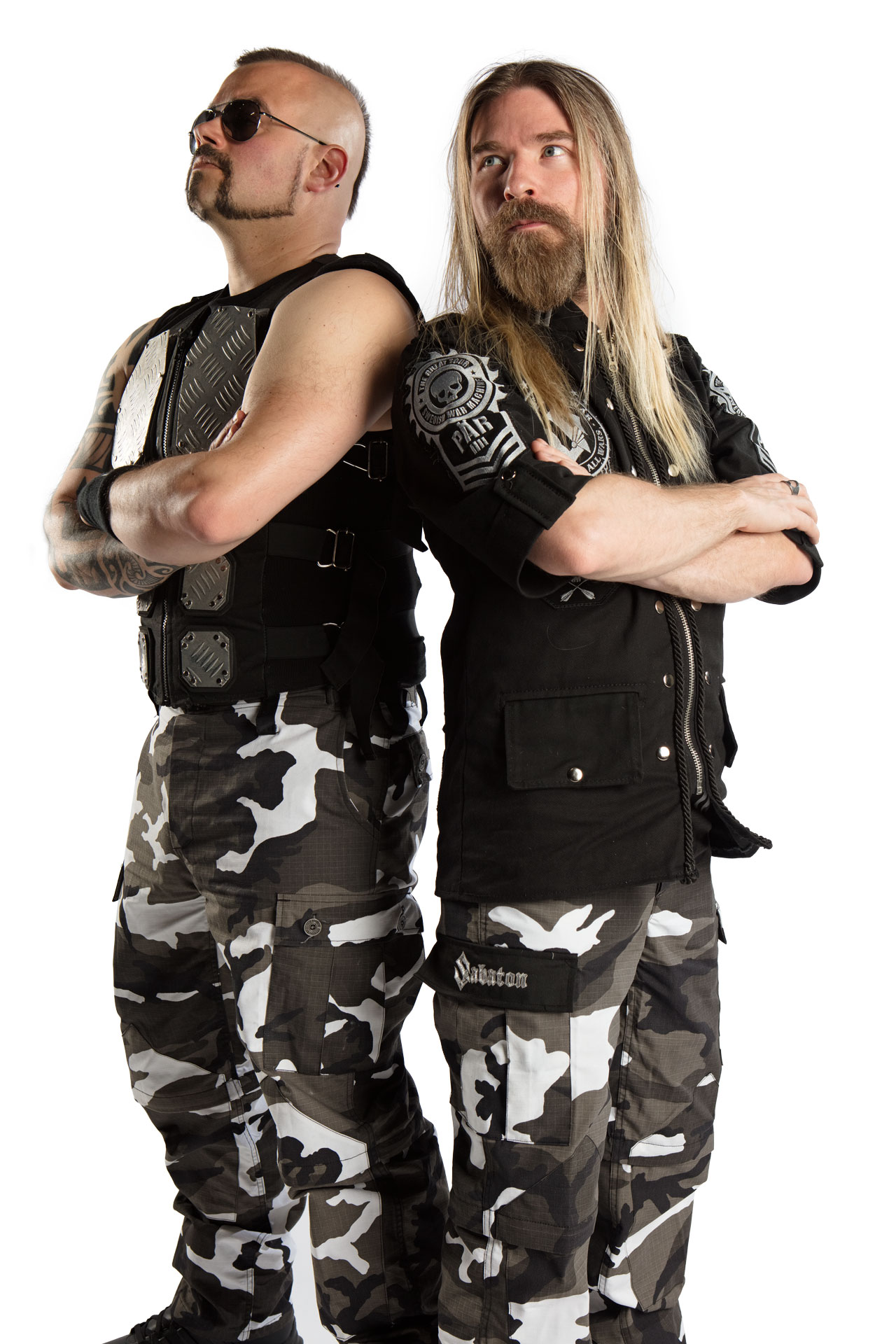
Inside the portacabin that doubles as Sabaton’s backstage production office are five neatly folded piles of clothes. Four of them are patterned with urban camouflage, while the fifth is a black jacket stitched with mirrored steel plates. This is Sabaton’s stage gear: their armour. “We’re the Village People in camo pants,” says Joakim Brodén with a laugh.
The singer is hugely entertaining company, talkative and funny with a laugh like a machine-gun. He’s an avid pinball player, to the extent where he’s a member of pinball clubs in Sweden and Norway. He even entered the Swedish national pinball championships, coming 112th out of around 300 people. “Playing pinball takes my mind off things for a few minutes,” he says.
Still, even in his civvies and without his shades, the 38-year-old looks like he should be doing pull-ups in some military gym somewhere. He’s broad and tattooed and the only thing that’s missing is a gigantic general’s cigar. Instead, he chain-chews a constant stream of nicotine gum. “I gave up smoking years ago, but I still use these,” he explains, settling into a plastic picnic chair while the tank rumbles off towards the stage in the distance. “It’s actually stronger.”
This rampant mastication is partly down to nerves. Tonight will see the debut of a new stage set, new songs, and, possibly most lethally, a new pyro display that will reportedly make Rammstein look like kids playing with sparklers on bonfire night.
“I need to know exactly where to stand, otherwise it’s ‘Whoosh!’” he says, making the shape of a mini-explosion with his hands. “So yeah, I’m super-nervous.”
Joakim and bassist Pär Sundström are the only two members of Sabaton who have been in the band since they formed in the Swedish town of Falun back in 1999. That alone tells you all you need to know about the dynamic. Between them, the pair write the music and lyrics (mostly Joakim, with help from Pär) and manage the band (mostly Pär, with help from Joakim).
It’s a partnership that has got them this far. Sabaton are heading up the generation of bands poised to step into the breach when the likes of Iron Maiden decide to finally hang up their flak jackets. They’ve achieved this through hard work (all of their albums are epic, the majority of them centred around a different, exhaustively researched, military-related theme) and big-thinking (they have their own cruise, festival, YouTube history channel and a link-up with the online games company Wargaming), and an angle that’s locked-down: heavy metal Action Men. Other bands sing about war and the heroes it produces, but few do it in such a grandiose fashion, with so much attention to detail and so much conviction.
The Great War is Peak Sabaton. As the title suggests, it hinges around World War I, the bloodiest and arguably most futile clash of nations in modern history. An estimated 16 million soldiers and civilians were killed and more than 21 million wounded during its four-year duration. It’s not surprising that Sabaton have finally decided to tackle the mother of all conflicts. What is surprising is how long it’s taken them.
“We had it in mind for a long time,” he says. “But the music was never right. We had planned for [2016’s] The Last Stand to be about World War One, but two weeks before we started recording, we realised that it was too catchy. With this one, there were much darker songs.”
Joakim started researching the album in May last year: studying, reading, watching documentaries, writing music. “The research never stops.”
He freely admits that he’s not an expert in any of the conflicts his band covers, explaining he’s “not going into troop movements and what happens on what day. That’s too much for me. But I like to go to a deeper amateur level and discover things about it: ‘Fuck, they did what now?’ That’s when you get emotional about it.”
He pauses for a second. “This is the first time it affected my mood.”
How so?
“I’m not saying I got into some kind of depression, but I could feel a dampening blanket over me. I felt a little bit numb. We’re searching for heroic stores, some kind of light or pride. But this is one of the darkest periods in the history of modern warfare. I think it got into the music. But you get through it.
"Emotionally, I want every Sabaton song to be the best Sabaton song ever.” He laughs his machine-gun laugh. “Intellectually, I understand that’s never going to happen.”
This is fairly indicative of Joakim’s approach to his band: serious about what they do, but with an awareness of how ridiculous it can seem. “We are not serious about ourselves,” he says. “But we are serious about the music and the subjects we sing about.” His chewing increases in intensity. “Very serious.”
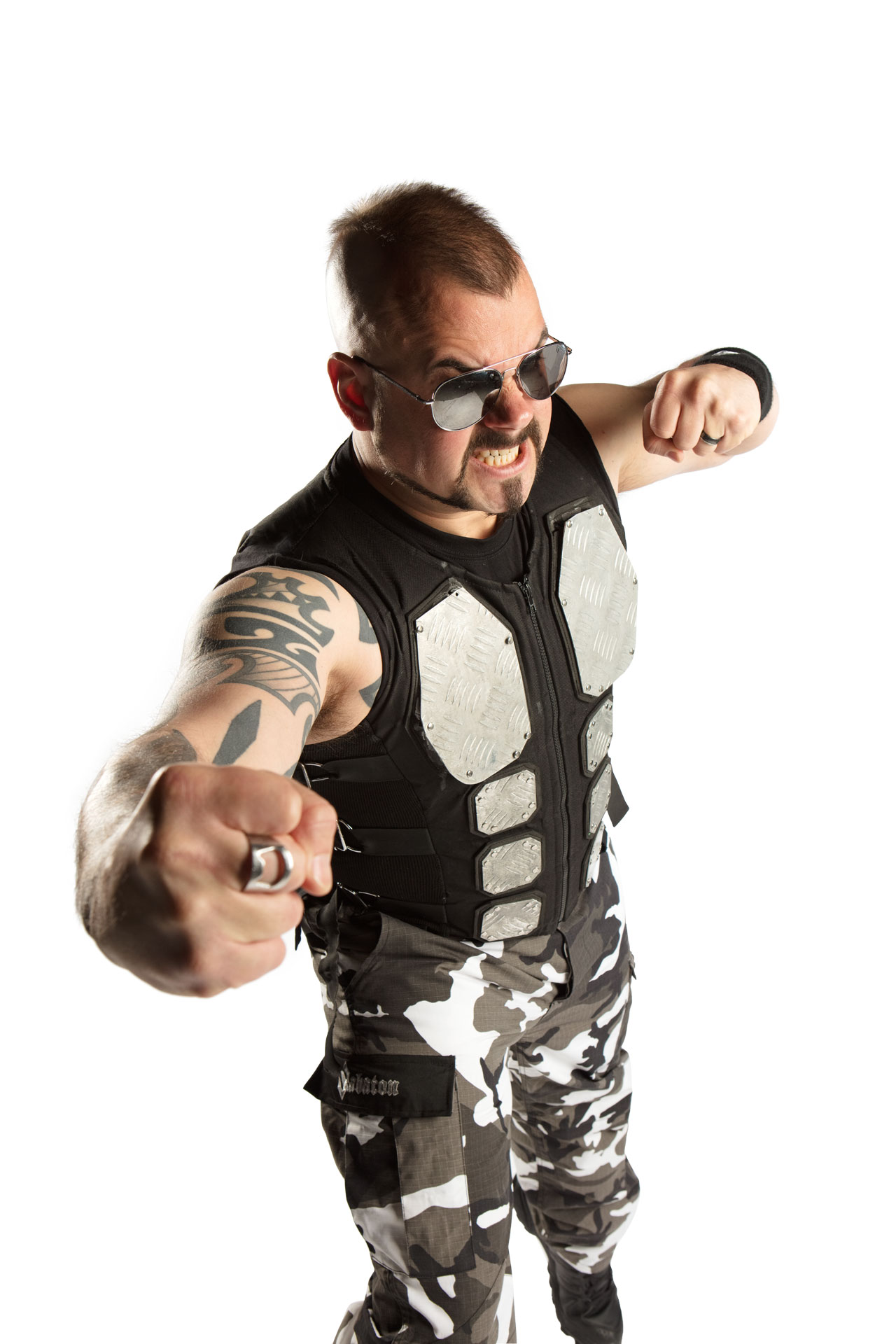
Outside, it’s raining. Huge droplets fall fast and cold, turning the ground to mud. A group of 20 or so men huddle in the awning of a small marquee. They’re all wearing what looks like authentic World War One costumes, albeit of different colours and with different insignia. Some are smoking cigarettes, hunched over and stamping their feet to keep warm.
Metal Hammer approaches one of the smokers and asks if he speaks English. He looks startled. “I am not sure I am supposed to speak to you,” he says suspiciously, then turns away. This is what it feels like to be caught behind enemy lines.
It turns out that this is the Czech choir that will join Sabaton onstage for much of their set tonight and at key dates on their run later this year, cunningly dubbed The Great Tour. The uniforms have been shipped in from a vintage military outfit supplier in London, and they replicate exactly the clothes worn by some of the participants of World War One: not just English and German soldiers, but French and New Zealand infantrymen, too.
Much of this kind of thing comes from the brain of Pär Sundström. Like Gene Simmons minus the shameless self-promotion, the bassist is the architect of many of Sabaton’s grandest ideas, from the Sabaton Open Air festival, which has taken place in their hometown every year since 2008, to their tie-ups with the online games World Of Tanks and World Of Warships.
“I see opportunities wherever I look,” he says, taking Joakim’s place in the production portacabin while the distant strains of a practising choir drift over. “If I watch a movie, I’ll email myself more than 20 times with ideas that I can use for Sabaton. You could say I have a problem with it.”
Their latest venture is the Sabaton History Channel, which launched in February and has already accumulated more than 100,000 subscribers. It features a series of high-quality mini-documentaries presented by Joakim and historian Indy Neidell that tell the stories behind key Sabaton tracks. Pär had the idea for it 15 years ago, and has a vision to building it up as a kind of grand video box set. “It will take a lot of time and cost a lot of money,” he says.
Is there a danger of Sabaton losing money on it?
“Sure. We had to front a lot of money. It pretty much took around €100,000 before it was launched.”
He seems unconcerned by this, but then Pär lives and breathes Sabaton even more than Joakim. It’s largely down to his force of will that Sabaton are where they are today.
“Since I was 13, I had one vision,” he says. “I wanted to be in the biggest heavy metal band in the world. I always wanted to do more than everybody else. Everybody else was lazy. When people say, ‘The job is done’, I’m the one saying, ‘No, how can we be better than the other team? How can we be stronger?’”
Like Joakim, he admits that he wasn’t a devotee of military history when he was younger, but that he dived into it with a characteristic enthusiasm when it became clear that Sabaton could turn a rail full of camo gear and set of songs about war into a decent career.
“In the beginning, we didn’t see the potential of it,” he says. “But we did one album, then people liked it. And then we added the camouflage pants and Joakim’s armour and it became our identity.”
Would Sabaton be as big as you are if you didn’t have such a well-defined image? He thinks for a few seconds.
“I don’t think so,” he says. “We’d be big, but not this big.”
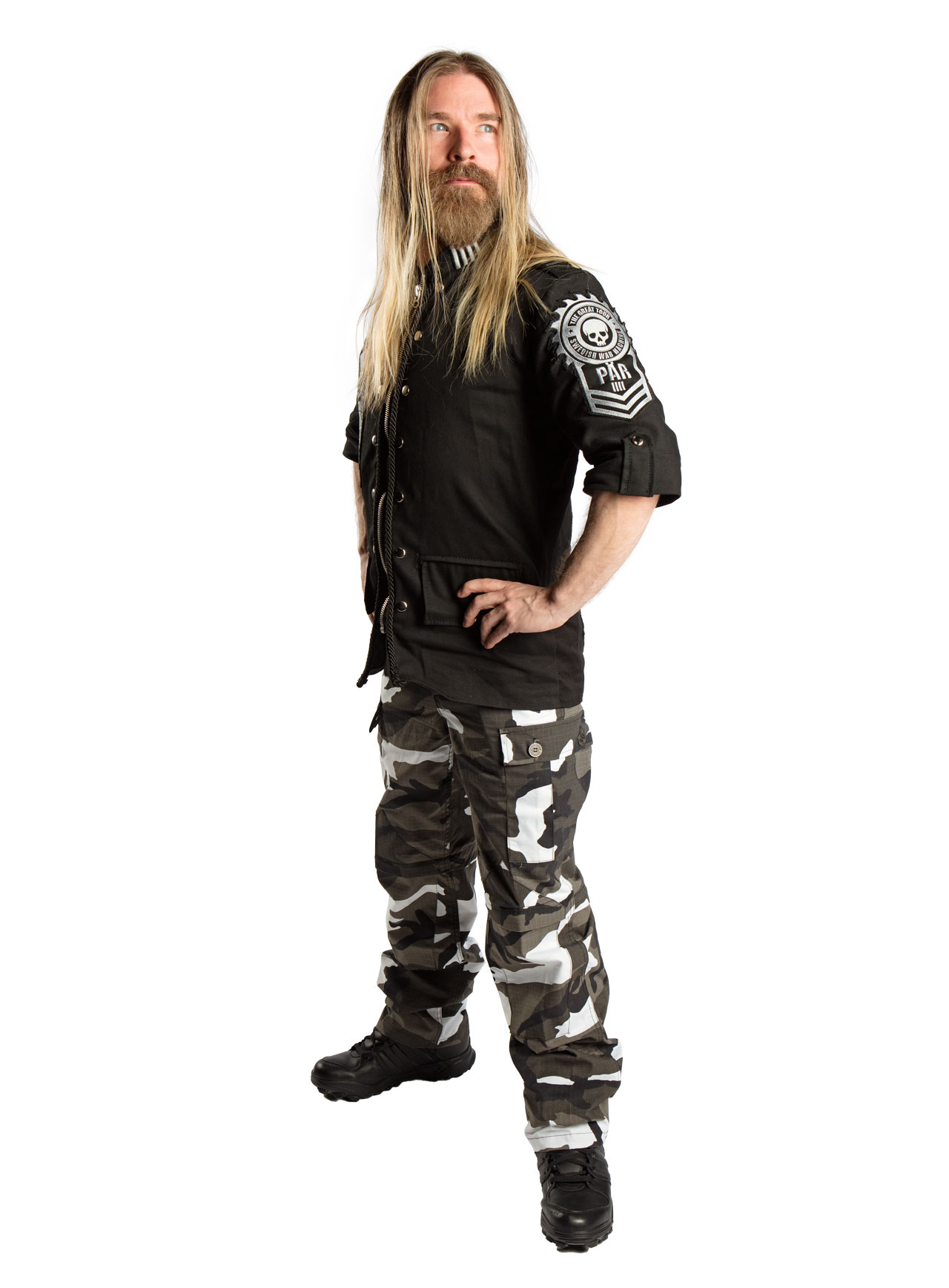
The tank that rumbled through the backstage area a while ago is now parked stage left. Joakim and Pär, plus guitarists Chris Rörland and Tommy Johansson and drummer Hannes van Dahl, will shortly clamber up on its turret for the Metal Hammer photoshoot, watched by a crowd of 20 or so people.
A pair of men in WWII fatigues look proudly on. It’s their tank. Metal Hammer asks one of them how much it would cost to buy. It turns out this one cost the equivalent of £500,000. Can they chuck in some ammo for that, Metal Hammer asks? They looked perplexed. We’ll take that as a ‘no’.
Sabaton have inevitably forged strong bonds with the military re-enactment community. It’s a fruitful two-way relationship. “They embrace us,” says Pär. “We’re making it easily accessible for people. They get more interest in what they’re doing. We bring in a lot of people.”
This mutual love-in has seen Sabaton accumulate a collection of vintage militaria, including shells from the D-day landings in Normandy and an 18th-century Polish cavalry sword gifted to them by the bishop of Gdansk. It’s all kept in their HQ back home. Metal Hammer has visions of one wall of the HQ being taken up by a giant map featuring flashing lights illustrating which countries they’ve conquered. “There is a map, but no flashing lights,” says Pär. “We use pins.”
The biggest irony about all this that Sabaton come from a country where National Service is an actual thing, yet neither Joakim nor Pär did their state-mandated time in the armed forces. In their defence, they came of age at a time when budget cuts meant that conscription wasn’t enforced. But still, like Donald Trump, these two action men are basically draft dodgers. Unlike Donald Trump, at least they admit it.
Even back then, Pär was too invested in the band he’d co-founded. He had seen how Sabaton’s original drummer had to quit after being posted miles away from the band’s hometown, and consequently managed to wriggle out of it himself. “I knew the band was important even then,” he says. “I didn’t want to lose it.”
Joakim was originally offered a 15-month stint guarding a marine base with a canine patrol. When surgery delayed that, he was told that the slot had been filled, but he could be Staff Platoon Officer, making cups of tea for senior ranks.
“I was, like, ‘For fuck’s sake, no way, I’m not doing that.’ I told them, ‘There’s been some complications from my surgery.’ I hope no one’s reading this cos I suppose I could go to prison.”
It’s things like this that provide ammo to the band’s critics. One of the milder grenades lobbed their way is that they’re a novelty band, a macho joke who have never put their money where their mouth is, combat-wise: ‘The Village People in camo pants,” as the singer put it earlier.
“That’s fine,” he says now. “I don’t care if people think we’re cheesy. I love catchy fucking 80s metal – I’m never going to apologise for writing a song like Shiroyama, which is like an 80s TV series theme with heavy metal. If people think I’m a joke for that, fine. But don’t piss on the subject we’re doing. That’s a serious thing. Laugh at us, how we dress, everything. But what we sing about, that’s not a joke.”
More serious is the accusation that Sabaton are Nazis. This is something that has dogged them since they adopted their martial identity in the mid 00s. It caused problems early on getting gigs in Germany, where, as Pär puts it, “‘Don’t mention the war’ is a big thing,” and reached a peak in their home country around the time of their breakthrough album, 2012’s Carolus Rex.
That record told the story of the rise and fall of the Swedish Empire in the 18th century, centred around King Charles XII, and was recorded in both Swedish and English versions. An album about the Swedish Empire, sung in Swedish, set more sensitive antennae twitching and the band found themselves in the strange position of having to deny they were goose-stepping knuckleheads on Swedish TV.
“There was a lot of controversy about it,” says Joakim. “Somehow the Swedish Empire is connected with the right wing. The right wing always try to take a patent on empires at certain times in history.”
Why do people think you’re Nazis?
‘Because they’re stupid. You think of me as a Nazi? I’m 50% Czech,” he says, referring to the anti-Slavic racism that was part of the Nazi’s poisonous outlook. “You think I’d call my mother an Untermensch? No. But there are always people who have a bunch of hatred towards us. We run into it on a daily basis. They say that we are secretly Nazis, or that we are right wing because we glorify war.”
But you do glorify war. And ultimately you’re making money off something that cost the lives of millions. Isn’t there any crisis of conscience involved?
“No, because we tell stories about what happened. People forgetting about it, that would make their sacrifice in vain, so I have no moral issues about it. If I was one day to become a millionaire singing about this, I would be proud because it would mean that so many people would have heard these stories. I can look back and be proud of what I’ve done.”
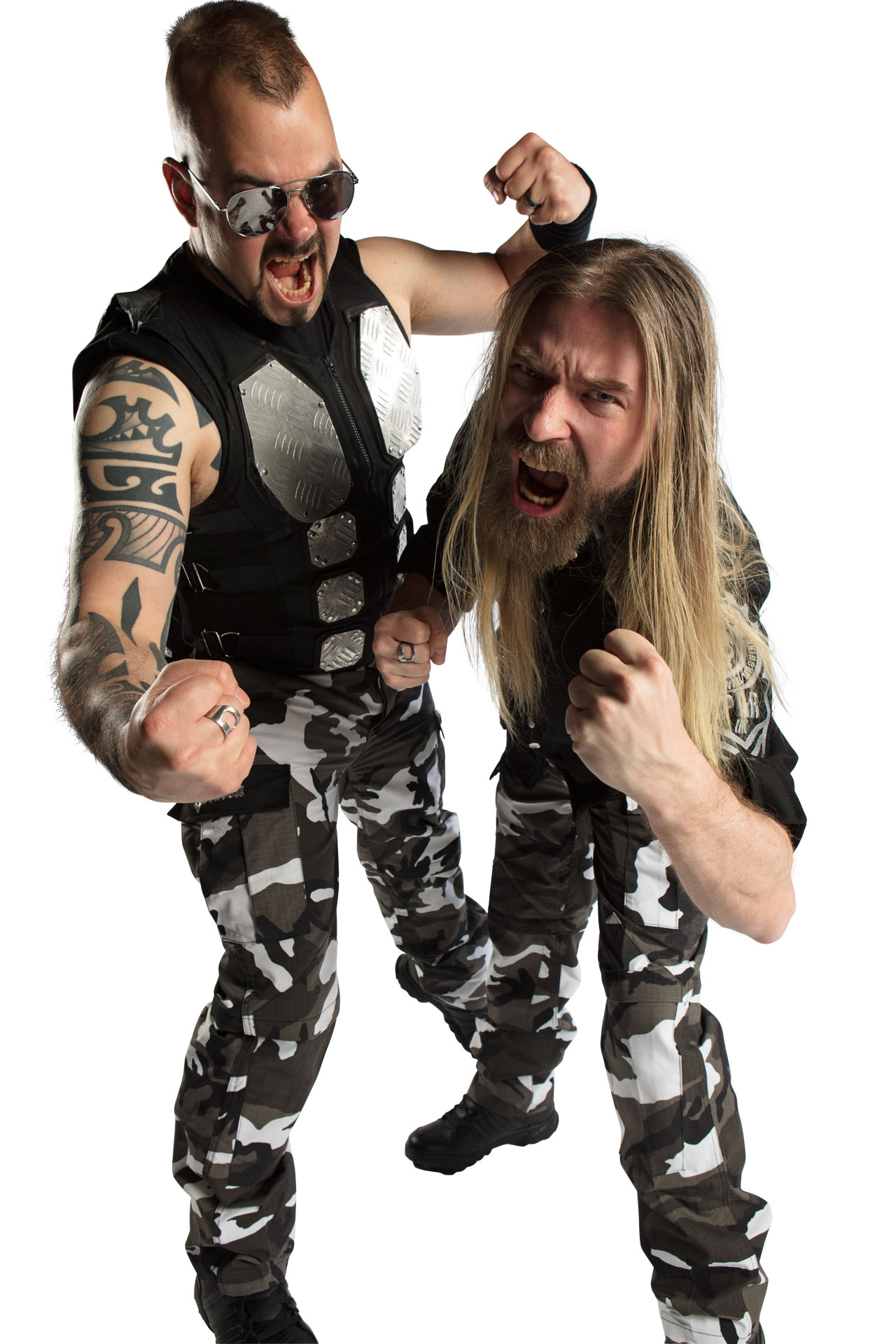
Of course, Sabaton aren’t Nazis. They’re storytellers, fulfilling a function that’s as old as war itself: celebrating the heroes and the triumphs and disasters that would otherwise go unrecorded. All they’ve done is given this age-old tradition a pummelling modern makeover. And, if the new stage show is anything to go by, added enough flames, explosions and weaponry to raze a medium-sized city.
The set is massive. The sandbags and barbed wire that line the front of the stage evoke the trench warfare that defined World War One. “It’s much darker, less metal and more military,” explains Pär.
The martial air is enhanced by the constant barrage of pyrotechnics exploding throughout the show: flashbombs erupt non-stop, huge jets of flames arc across the stage, the famous tank drum-riser blazes with searing heat and light.
Then there’s the choir. The 20 men who’ve been huddled backstage troop dutifully on, adding genuine emotional weight to Sabaton’s musical blitzkrieg. Amid all the flames and noise, it’s a strangely human dimension.
Still, it all feels like a mammoth achievement. As Joakim Brodén pointed out earlier, you can’t imagine another band doing any of this: not just the stage show, but the entire camo-coloured ecosystem Sabaton have created for themselves. It does make you wonder how much further Sabaton can take this, musically and conceptually. “We could fuck with people and do an album called ‘Ceasefire,’” says Joakim with a laugh.
We try pushing Pär for his future plans. Action figures, maybe? Pinball machines? A movie? He’s cagey. “I have some ideas,” he says. “But it’s too early.”
Joakim is less circumspect. “I want to play on Normandy beach on June 6 one day,” he says. “The crowd isn’t coming in like a crowd normally would through a gate, they’re arriving on boats, like soldiers. The doors come down, and they run on the beach like the soldiers would have, and there’s pyros going off, and we start playing up on one of the bunkers.”
Wow. You’re talking about recreating D-Day on the anniversary of the landings as a gig? That could be brilliant, or that could be the most offensive thing ever.
“Maybe,” he says with a shrug. “But I don’t give a fuck. Everybody gets so butt-hurt about everything these days, it’s depressing. Are we breaking any laws? Are we doing anything morally wrong? Are we genuinely hurting anybody’s feelings or pissing on their family history? If the answer is ‘no’, then I don’t care if someone takes offence on somebody else’s part.”
He’s chewing his gum ferociously now – a pissed-off parade ground sergeant daring you to contradict him. The message comes through clear: Sabaton are rolling unstoppably on. Get onboard, get out of the way or get crushed in the dirt. The choice is yours.
Dave Everley has been writing about and occasionally humming along to music since the early 90s. During that time, he has been Deputy Editor on Kerrang! and Classic Rock, Associate Editor on Q magazine and staff writer/tea boy on Raw, not necessarily in that order. He has written for Metal Hammer, Louder, Prog, the Observer, Select, Mojo, the Evening Standard and the totally legendary Ultrakill. He is still waiting for Billy Gibbons to send him a bottle of hot sauce he was promised several years ago.

